![7 Best K-12 Learning Management Systems [LMS] in 2025](https://cdn.prod.website-files.com/62f0b227e38c6d799afcd8ba/675eb2323a136e7b24b61845_6634ec52c8a9b56b2556841a_K12_Guide-min.webp)
![7 Best K-12 Learning Management Systems [LMS] in 2025](https://cdn.prod.website-files.com/62d6876535c5c7559909754c/67c036910fbf3721b5778e27_Attendance_Zoom-min%201.png)

Key Takeaways
- Discover how EdisonOS, Google Classroom, and other top systems boost student engagement and streamline remote learning
- See how EdisonOS enables customized SAT prep and blended learning for a tailored education experience
- Learn the must-have LMS features like multimedia integration, advanced assessments, and mobile accessibility for flexible learning
Modern technology is pivotal in shaping the K-12 education system. The adoption of K12 learning management systems (LMS) has significantly enhanced student engagement and simplified remote learning. These systems are designed to provide a dynamic and interactive environment, offering tools like gamification, multimedia, and detailed analytics to aid educators and students.
Top 7 K12 Education Management System LMS for 2025
With numerous K12 Learning Management Systems (LMS) available, it can be overwhelming to find the perfect one. We have reviewed, analyzed, and tested several online learning platforms for K-12 education and compiled this list based on key factors like usability, features, and pricing.
1. EdisonOS - Unlocking the Best of Virtual Learning
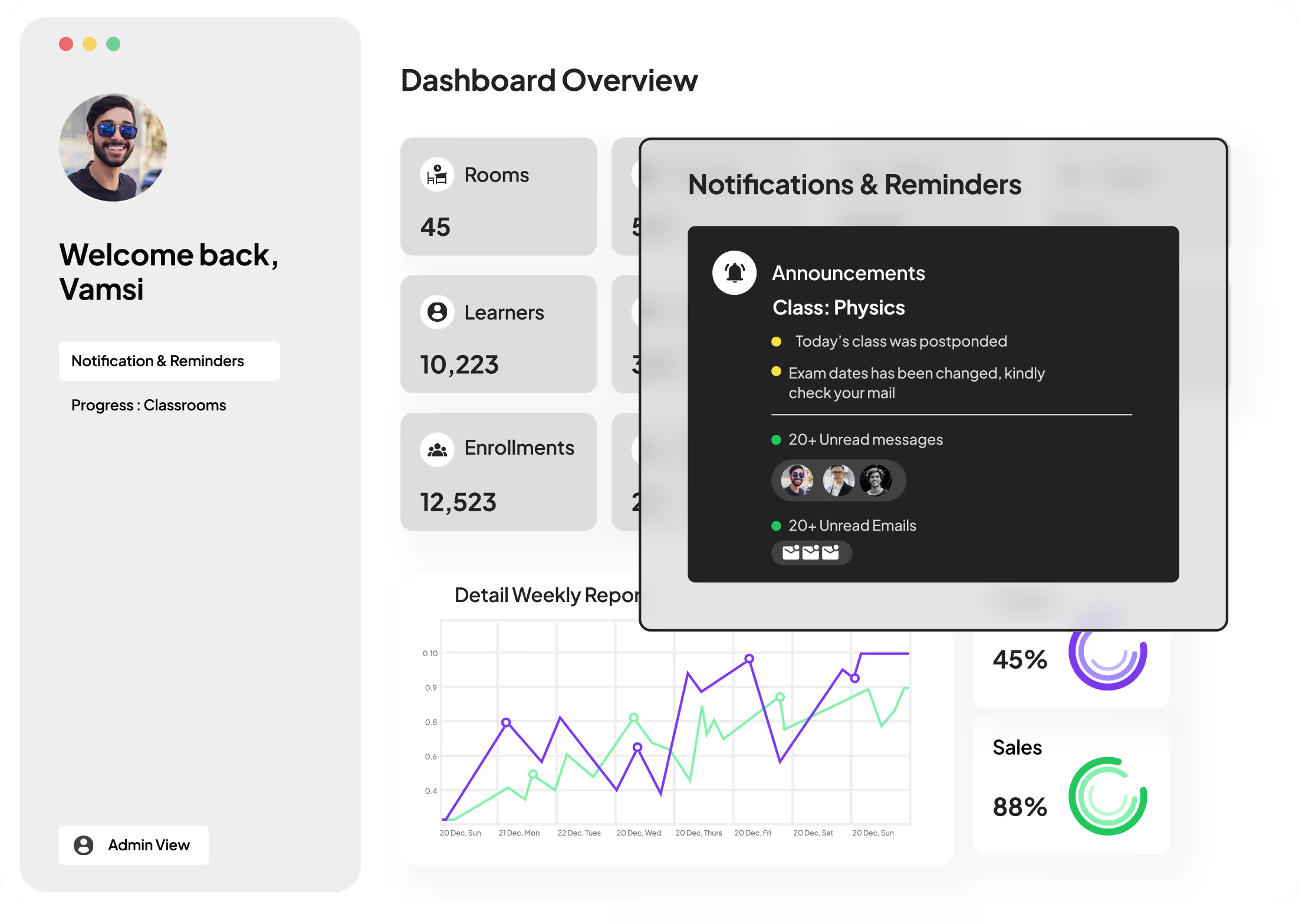
Overview
EdisonOS is a leading K12 learning management system designed to deliver seamless online and blended learning experiences. Positioned as a robust tool for K12 education, it offers personalized course creation and advanced tools for SAT preparation, making it an excellent fit for schools looking to enhance both in-person and remote learning. Its intuitive interface and versatile assessment tools are key differentiators, providing teachers with the ability to customize content and track student progress efficiently.
Key Features
- Seamless integration of blended learning methods.
- Customizable SAT preparation courses.
- Intuitive and user-friendly interface for both students and teachers.
- Advanced reporting and analytics to measure student performance.
- Interactive assessments that keep students engaged.
Pros
- Highly customizable course creation and assessments.
- User-friendly design that simplifies lesson planning.
- Strong focus on SAT preparation with tailored resources.
Cons
- Limited third-party integrations compared to competitors.
- Pricing may be high for small-scale institutions.
Integrations
EdisonOS integrates with:
- Zoom for virtual classrooms.
- Google Drive for resource storage and sharing.
- Various calendar tools for scheduling.
Overall Rating
4.7/5
Pricing
EdisonOS offers a 14-day free trial, with paid plans starting at $159 per learner per month.
2. Google Classroom - Empowering Educators, Enriching Learners
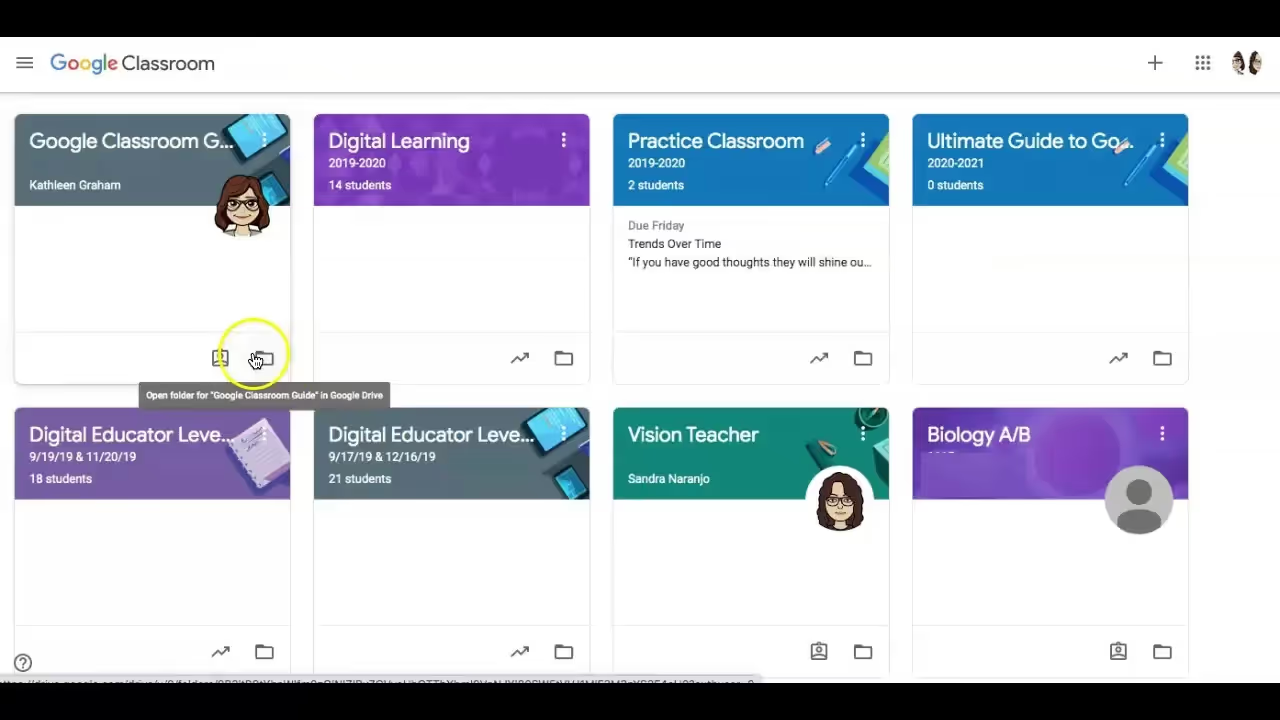
Overview
Google Classroom is an easy-to-use K12 learning management system designed to help educators streamline lesson delivery, grading, and communication. As part of the Google Education Suite, it integrates seamlessly with other Google tools, making it ideal for schools already using Google Workspace. Google Classroom fosters collaboration among students and teachers by providing a simple interface and effective communication channels. It’s a great fit for K-12 schools looking for an accessible, low-cost solution to manage online learning.
Key Features
- Seamless integration with Google Suite (Docs, Drive, Gmail, Meet).
- Easy assignment creation and distribution.
- Real-time collaboration and communication between students and teachers.
- Simplified grading and feedback tools.
- Mobile app for access across devices.
Pros
- Completely free for educational institutions.
- Easy to set up and use, especially for schools already using Google tools.
- Enables real-time collaboration among students and teachers.
Cons
- Limited customization options for course creation.
- Basic functionality compared to some premium LMS platforms.
Integrations
Google Classroom integrates effortlessly with:
- Google Drive for storage.
- Google Meet for virtual meetings.
- Third-party tools like Edpuzzle for interactive lessons.
Overall Rating
4.5/5
Pricing
Google Classroom is part of Google Workspace for Education, free for schools. Advanced features are available with premium plans—contact Google for specific pricing.
3. Canvas LMS - Empowering Schools, Elevating Distance Education
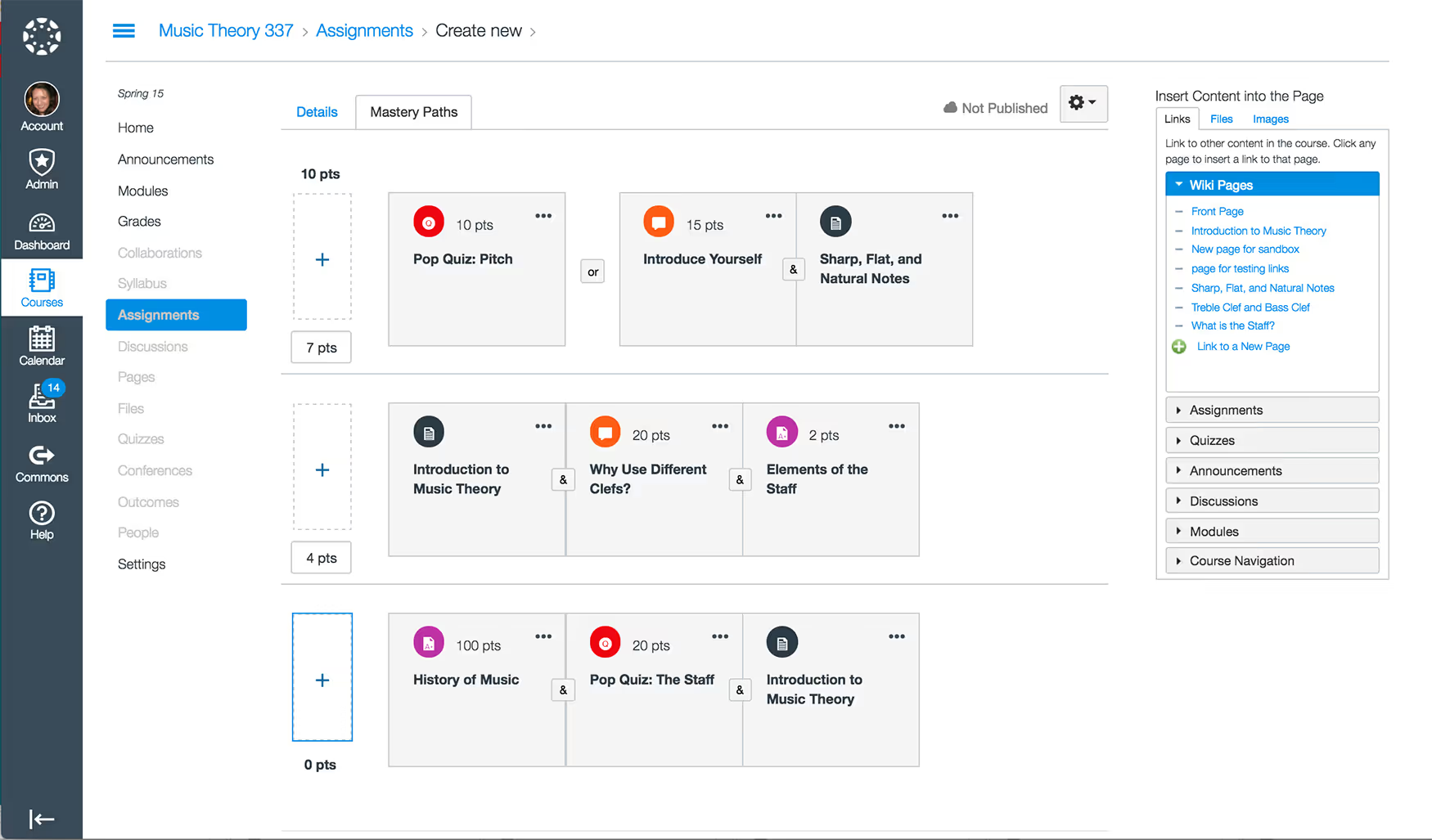
Overview
Canvas LMS is a highly versatile K12 learning management system used in both K-12 schools and higher education institutions. It is known for its robust suite of learning tools and an intuitive interface that makes it easy to create interactive, multimedia-rich courses. Canvas LMS offers comprehensive assessment features, powerful analytics, and seamless integrations with various third-party tools, making it a top choice for schools looking for a flexible yet powerful LMS.
Key Features
- Multimedia integration for course content creation.
- Powerful grading and assessment tools.
- Customizable learning paths for personalized student experiences.
- Advanced analytics for tracking student performance.
- Seamless integration with existing educational systems.
Pros
- Extremely customizable with a wide range of tools.
- Robust grading and assessment features.
- Excellent analytics for tracking student progress.
Cons
- Can be overwhelming for beginners due to its extensive feature set.
- The premium version can be expensive for smaller institutions.
Integrations
Canvas LMS integrates with:
- Zoom for virtual classes.
- Google Drive and Microsoft OneDrive for storage.
- Various third-party education tools (e.g., Khan Academy, Quizlet) exist.
Overall Rating
4.6/5
Pricing
Canvas offers a free version with basic features. Advanced features are available through paid plans—contact Canvas for a detailed quote.
4. Blackboard Classroom - Supporting Students with Comprehensive Features
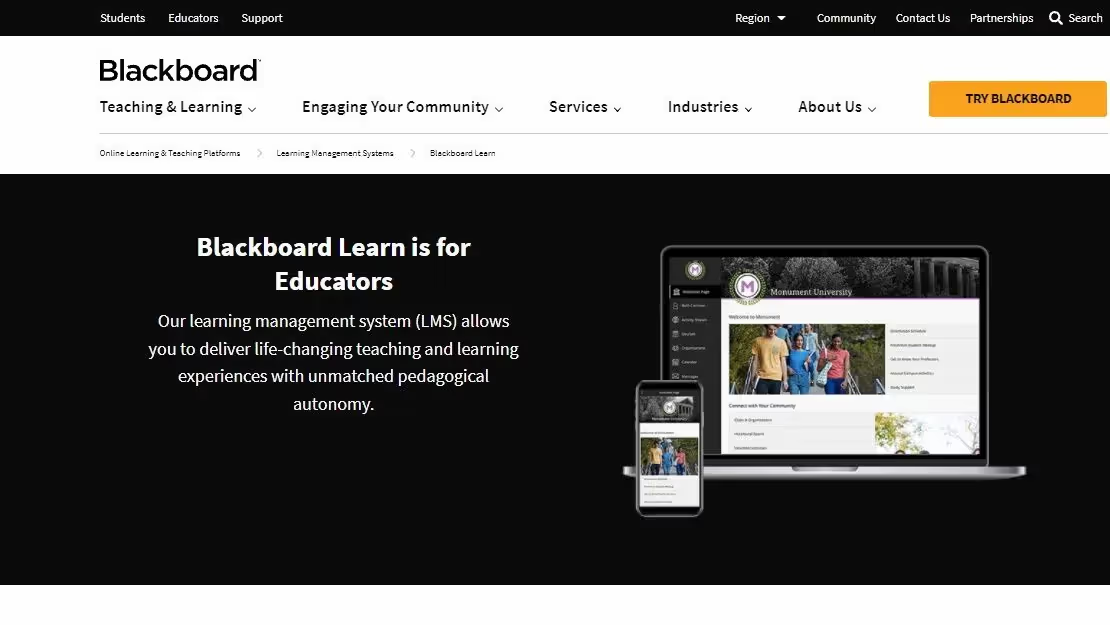
Overview
Blackboard Classroom is a comprehensive K12 learning management system that supports interactive learning environments and advanced data analytics. Its intuitive interface allows teachers to personalize instruction, while its analytics features help administrators track student progress. Blackboard Classroom also supports collaborative learning through virtual classrooms and discussion forums, making it an ideal choice for schools seeking a feature-rich platform with powerful analytics tools.
Key Features
- Advanced analytics tools for tracking student performance.
- Virtual classrooms for real-time collaboration.
- Interactive multimedia content support.
- Customizable learning environments for personalized learning experiences.
- Robust reporting features for educators and administrators.
Pros
- Advanced analytics for data-driven decision-making.
- Strong virtual classroom features for real-time learning.
- Highly customizable for different educational needs.
Cons
- Pricing can be high for small institutions.
- A steeper learning curve compared to simpler LMS platforms.
Integrations
Blackboard Classroom integrates with:
- Zoom and Microsoft Teams for virtual learning.
- Google Drive and Dropbox for file storage.
- A range of third-party tools for educational content.
Overall Rating
4.4/5
Pricing
Blackboard offers flexible pricing options based on institutional needs. You can request a quote for detailed pricing information.
5. Alma - Unleashing Learning Potential
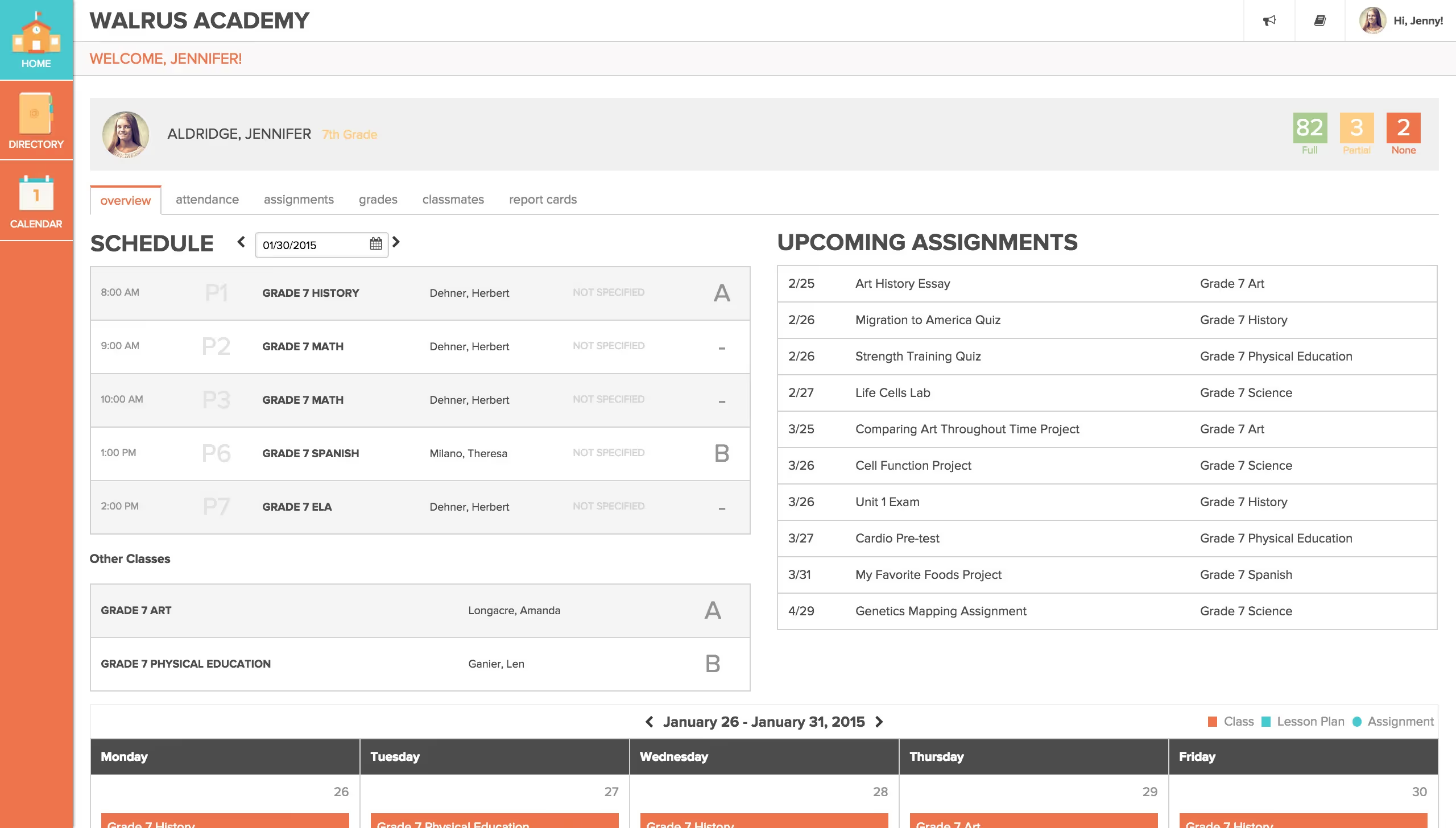
Overview
Alma is an innovative K12 learning management system designed to streamline classroom management, assessment, and reporting. It focuses on delivering a tailored learning experience through data-driven insights and professional development tools for educators. Alma stands out by providing easy access to progress tracking and personalized learning experiences for students. It’s particularly useful for schools looking for a centralized system to manage both teaching and administrative tasks.
Key Features
- Professional development tools for educators.
- Comprehensive student progress tracking and analytics.
- Centralized platform for managing assignments, grades, and communication.
- Supports personalized learning paths for students.
- Resource-rich platform with collaborative tools for group work.
Pros
- Strong focus on teacher development and student progress tracking.
- Easy-to-navigate interface for educators and students.
- Comprehensive reporting and analytics tools.
Cons
- Limited third-party integrations compared to other LMS platforms.
- Pricing can be prohibitive for smaller schools.
Integrations
Alma integrates with:
- Google Drive for document storage.
- Zoom for virtual classrooms.
- Third-party grading tools.
Overall Rating
4.3/5
Pricing
Alma offers customized pricing based on institutional needs. Contact them directly for a detailed quote.
6. Green LMS - Access Ecological Learning Solutions
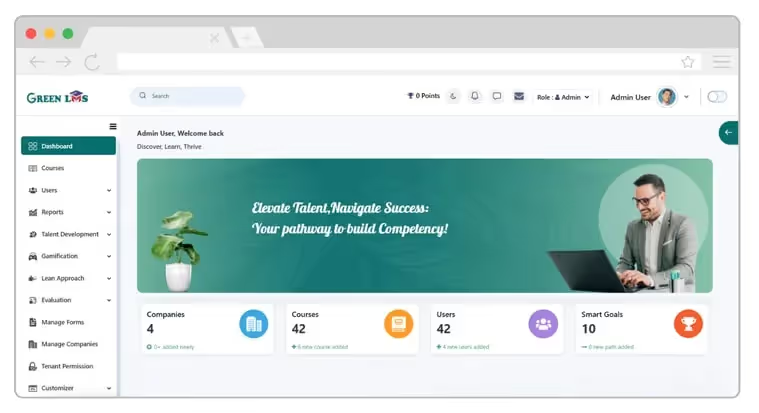
Overview
Green LMS is an eco-friendly, performance-oriented K12 learning management system designed to meet the modern educational needs of schools. It provides a feature-rich, intuitive interface that makes course creation and learning management easy. Green LMS places a strong emphasis on gamification and interactive learning, enabling educators to create engaging content that encourages collaboration and participation among students. It’s particularly beneficial for schools that focus on flexible, mobile-friendly learning environments.
Key Features
- Gamified course content creation with multimedia support.
- Flexible, mobile-friendly platform for anytime access.
- Interactive assessments and collaborative group projects.
- Real-time analytics and reporting to track student progress.
- Secure platform with compliance frameworks to protect student data.
Pros
- Highly engaging, gamified learning tools.
- Multi-device accessibility for students on the go.
- Comprehensive security protocols for data protection.
Cons
- The pricing structure may be high for small schools.
- Limited integrations compared to larger platforms.
Integrations
Green LMS integrates with:
- Zoom for virtual classes.
- Google Drive for document sharing.
- A variety of third-party assessment tools.
Overall Rating
4.5/5
Pricing
Green LMS offers several pricing plans, with the micro plan starting at $498. Additional plans are available for larger institutions.
7. Edly -Affordable LMS for All
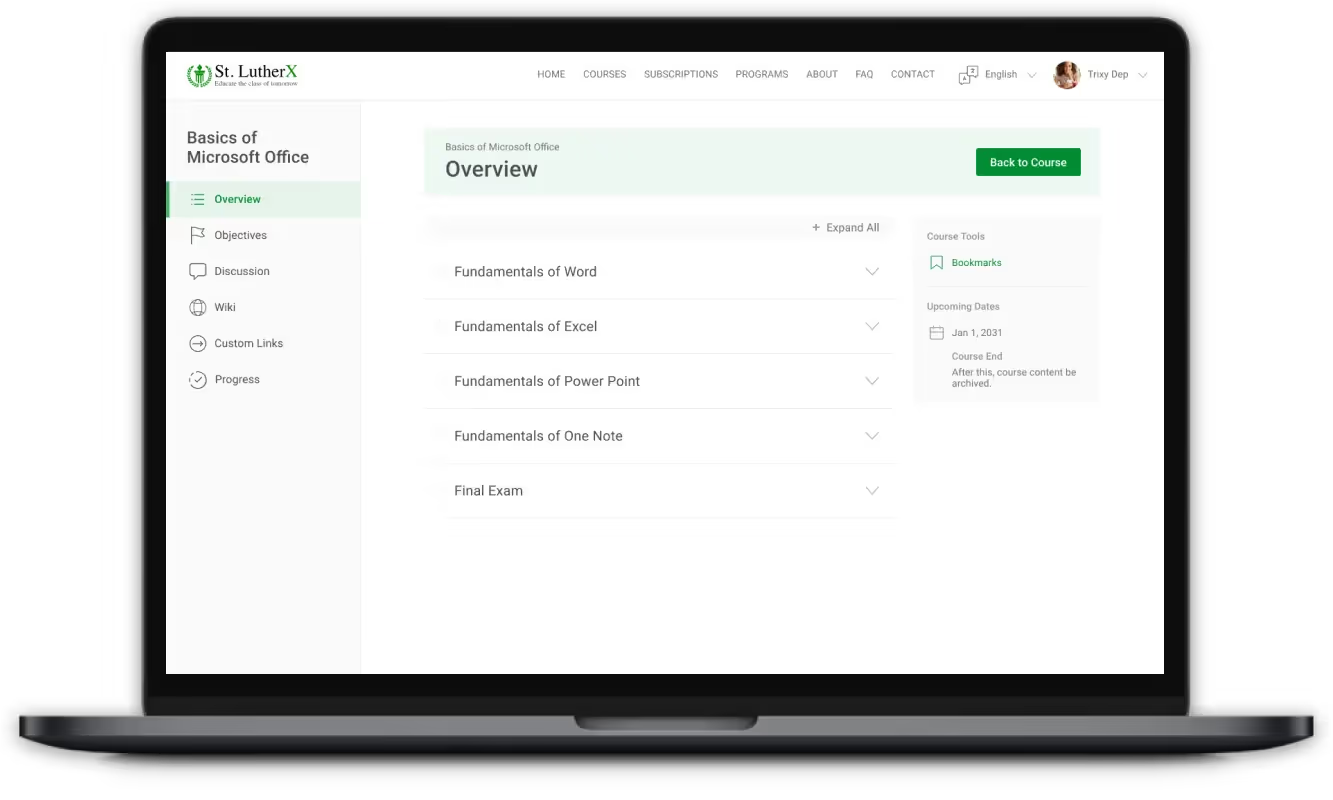
Overview
Edly is an affordable K12 learning management system designed for schools seeking to enhance the learning and instruction process. With a focus on personalized learning, Edly allows educators to tailor their teaching to the specific needs of each student. It also offers robust communication tools, making it easier for students and parents to stay engaged with the learning process. Edly is ideal for K-12 schools looking for an affordable, cross-platform LMS that provides strong support for student-teacher collaboration.
Key Features
- Personalized learning paths for students.
- Cross-platform accessibility for mobile and desktop use.
- Communication tools that foster student and parent engagement.
- Customizable reports and analysis for tracking student progress.
- Discussion forums and group assignments for collaborative learning.
Pros
- Affordable pricing for small to mid-sized schools.
- Cross-platform access with mobile app support.
- Strong communication and collaboration tools.
Cons
- Fewer advanced features compared to higher-end LMS platforms.
- Limited support for third-party integrations.
Integrations
Edly integrates with:
- Google Drive for file storage.
- Zoom for virtual learning.
- Parent portals for tracking student progress.
Overall Rating
4.4/5
Pricing
Edly offers a one-month free trial, with paid plans starting at $275 per month. Additional features may incur extra charges.
What is the K-12 Learning Management System (LMS)?
In simple words, K-12 learning management is a set of elements that schools use to manage, organize, and deliver educational content for K-12 students. It is one kind of platform that allows educators to deliver professional learning experiences to students in digital learning, from the course creation process to tracking student performance to distributing curriculum resources and assessing student learning results.
Key Features Your K12 LMS Must Have
When selecting the best Learning Management System (LMS) for K12 education, it's crucial to consider key features that align with the unique needs of students, teachers, and administrators. Look for an LMS that offers:
- An intuitive interface ensures ease of use for both educators and students, facilitating seamless navigation and interaction within the platform.
- Robust tools for creating interactive course content, such as multimedia integration, quizzes, and collaborative assignments, enhance engagement and learning outcomes.
- Customizable learning paths allow educators to tailor content and assessments to individual student needs, fostering personalized learning experiences.
- Advanced assessment features, including automated grading, feedback mechanisms, and analytics, enable educators to assess student progress effectively and identify areas for improvement.
- Features like discussion forums, group projects, and virtual classrooms promote collaboration and peer-to-peer interaction among students, enhancing collaborative learning experiences.
- Ensure the LMS is compatible across devices, enabling students to access course materials, submit assignments, and participate in discussions on smartphones and tablets for flexibility and convenience.
These features make a difference in providing a modern and effective digital learning environment for K12 education, empowering educators and students to succeed.
Things to Consider When Choosing the Best Learning Management System (LMS) for K12 Education System
Choosing the right LMS for K12 education can be challenging, especially with the myriad options available. Here are some factors to consider:
- Ease of Use – Ensure the platform is easy to use for both educators and students, with minimal learning curves.
- Customization Options – The ability to customize courses, assessments, and student learning paths will allow for more personalized education.
- Integration with Existing Tools – Check if the LMS integrates with your school’s current systems, such as Google Classroom, Zoom, or other tools.
- Security Features – Look for an LMS that prioritizes data security, including compliance with regulations such as FERPA or COPPA.
- Cost vs. Features – While cost is a factor, it's essential to ensure that the LMS provides the features you need to deliver effective education.
Benefits of LMS in K12 System
The implementation of an LMS for K12 education provides numerous benefits to schools, educators, and students:
- Enhanced Student Engagement – LMS platforms provide interactive content, quizzes, and gamification that keeps students engaged in the learning process.
- Personalized Learning – Tailor lessons and assessments to meet the specific needs of each student, allowing them to learn at their own pace.
- Improved Communication – Real-time communication tools like messaging and discussion boards foster better interaction between teachers, students, and even parents.
- Streamlined Administrative Tasks – LMS platforms help reduce the workload for educators by automating tasks like grading, attendance tracking, and report generation.
- Data-Driven Insights – LMS systems provide valuable data on student performance, enabling teachers to make informed decisions and adjust teaching strategies accordingly.
Why is EdisonOS the Best K12 Learning Management System (LMS)?
EdisonOS stands out as the best K12 learning management system due to its unique combination of features tailored to both educators and students:
- Customizable Learning Paths – EdisonOS allows educators to create personalized learning experiences that meet each student's needs, from K-12 curriculum to SAT preparation.
- Blended Learning Environment - Whether it's online or in-person, EdisonOS supports a flexible teaching approach that adapts to schools' needs.
- Comprehensive Reporting – With advanced reporting and analytics, teachers can track student progress, identify gaps in learning, and tailor their strategies accordingly.
- Seamless Integration - EdisonOS seamlessly integrates with tools like Zoom and Google Drive, making it easy to manage resources and deliver lessons efficiently.
- User-Friendly Interface - An intuitive interface simplifies navigation, course creation, and learning management for both teachers and students.
By combining cutting-edge technology with an understanding of educational needs, EdisonOS empowers schools to create an engaging, efficient, and impactful learning environment.

Recommended Reads
Podcasts







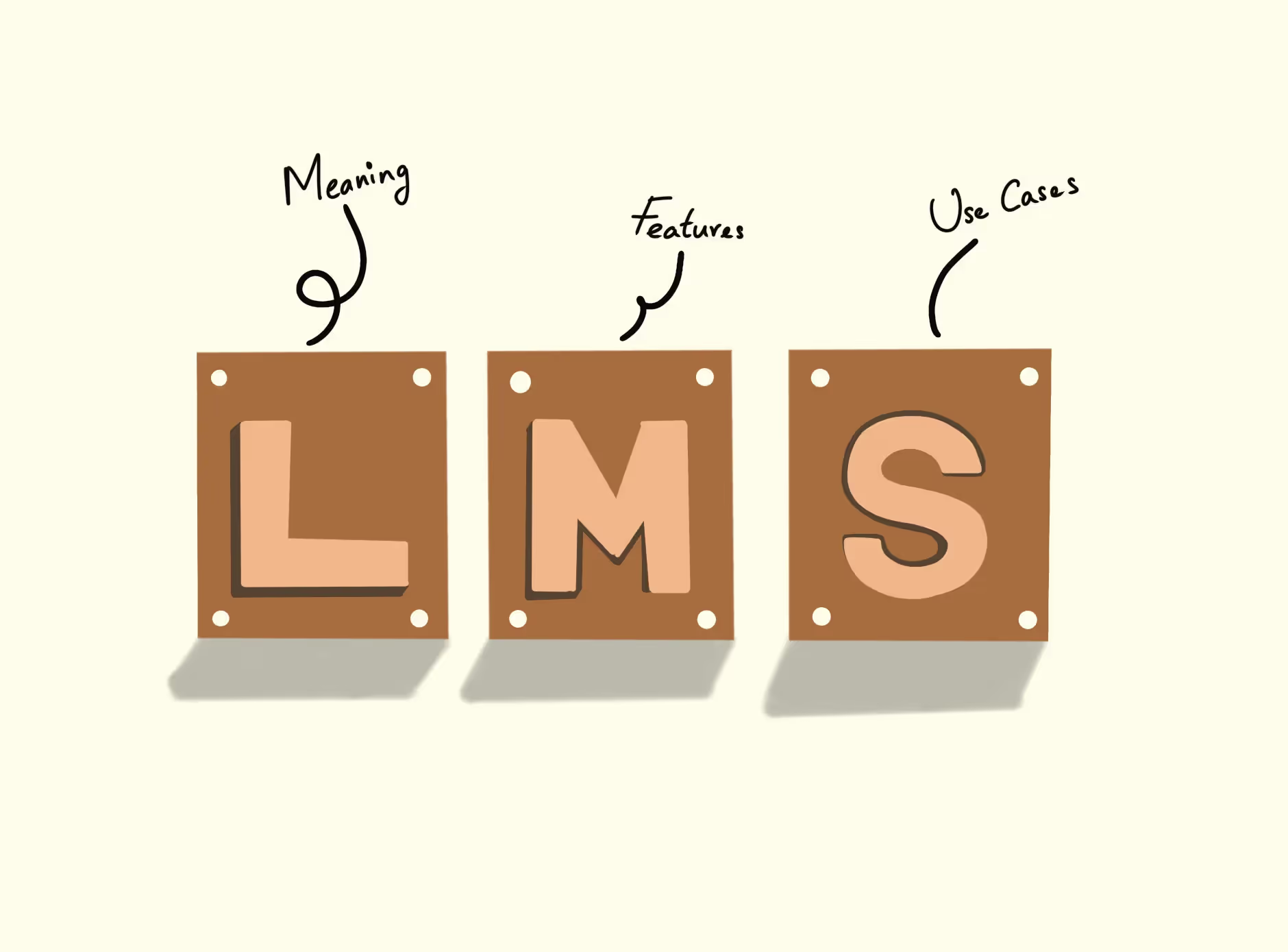



.png)
.webp)
